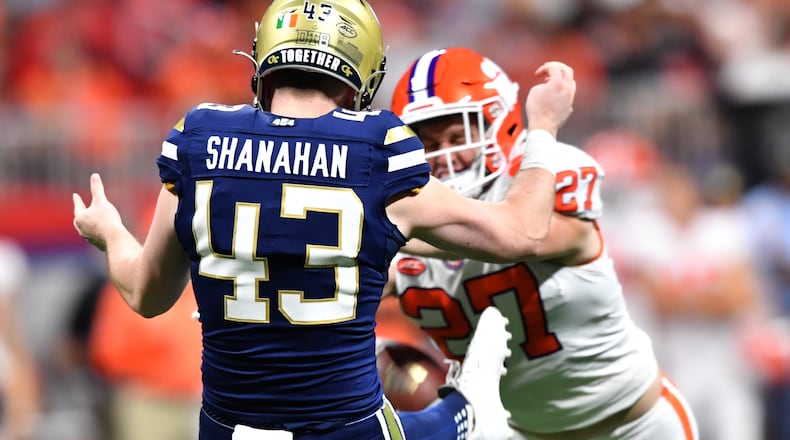In the team’s first practice of the week, Georgia Tech coach Geoff Collins did not tarry Wednesday in addressing a critical flaw in the Yellow Jackets’ performance in their 41-10 loss to No. 5 Clemson on Monday night. That would be the punt unit, which surrendered two blocked punts that led directly to 14 points for the Tigers.
As the Jackets prepare for their second game of the season – at home against Western Carolina on Saturday – their inability to prevent Clemson from doing something twice in a game that the Tigers hadn’t done even once in a game since 2015 is a bit of a Rorschach test for Tech fans.
It might be encouraging that one of the bigger issues from Monday night’s game would seem fairly easy to correct. After all, 63 FBS teams made it through the 2021 season without a single punt blocked (Tech allowed one). On the other hand, what does it say that the Jackets couldn’t execute a seemingly rudimentary play without mishap, particularly when they should have been on high alert for it after the first instance?
“It’s just one of those things that happened,” Collins said Wednesday at his weekly news conference. “(On the first block), it was a really good player that was going through the gap, and (we) just didn’t use proper fundamentals and technique, and then the second-level defender that was there wasn’t able to clean it up. Unfortunate that it happened, but we’ve got to move on from it. We’ve got to correct it, and we’ve got to get better on all of those things and all of those areas.”
In both instances, Tech players on the line of scrimmage failed to make effective blocks, and second-level players between the line and punter David Shanahan had their attention trained on Clemson players coming off the edge rather than the ones charging up the middle. Facing split-second decisions, they did not heed the coaching point of working “inside out” – putting a priority on stopping the punt blocker coming up the middle over the one attacking from the edge.
The performance raised questions anew about whether the Jackets can extract an advantage out of the kicking game, an area in which Collins’ team often has been wanting as he begins his fourth season.
Elements of Tech’s special teams have been superior. In 2020, punter Pressley Harvin won the Ray Guy Award as the nation’s top punter as the Jackets finished second in the FBS in net punting. Last year, Gavin Stewart’s kickoffs helped the Jackets solve a major problem for them in recent years as Tech’s kickoff coverage team was ranked first in the FBS by Football Outsiders. (Stewart, the younger brother of former Tech receiver Brad Stewart, was 3-for-3 on touchbacks Monday.) Jahmyr Gibbs finished 23rd in the FBS in kickoff return average a year ago.
But other areas have been spotty. Tech’s punt net ranking dropped to 122nd last season in Shanahan’s first season of football. The Jackets ranked 106th in field-goal accuracy last season after placing 123rd in 2020 and 130th (last) in 2019. Collins said before last season of transfer kicker Brent Cimaglia that, “I’ve got to imagine he’s going to be one of the top kickers in America,” but Cimaglia finished 11-for-15 on field-goal attempts, with a long of 37 yards.
Tech has not made a field goal of 50-plus yards since 2016, Harrison Butker’s final season. (Jude Kelley’s second-quarter try from 50 yards Monday night just missed.) In Collins’ three seasons, Tech has broken one punt return of 30 or more yards.
Collins has paid no small priority to special teams. During practice periods devoted to punt operations, Collins is front and center in running the drills. His emphasis on effective play at the gunner position on the punt unit helped earn Nathan Cottrell a spot in the NFL.
But for a team that figures to be scraping for wins and needing every advantage it can obtain – bookmakers set Tech’s over/under win total at 3.5 – Monday’s special-teams performance did not bode well. Mistakes are commonplace in season openers, but 118 FBS teams were able to make it through their first game (or first two games, in some cases) without allowing a single punt to be blocked.
Collins was asked Wednesday why he chose not to hire a special-teams coordinator this past offseason when he had seven assistant-coach vacancies to fill. Perhaps the most expedient way for Collins to have done that would have been either to keep defensive coordinator Andrew Thacker as linebackers coach or, after Marco Coleman left for Michigan State, to expand Larry Knight’s role to coaching the entire defensive line, where he previously had coached the tackles.
But Collins chose to hire Jason Semore to coach the linebackers and free Thacker to oversee the defense and to add David Turner to coach the tackles and move Knight to replace Coleman coaching the ends.
Multiple coaches on the staff coach various units on special teams. It is a common setup. In the ACC, only one team (Syracuse) has a coach whose sole responsibility is coaching special teams.
“I’m heavily involved, as well,” Collins said. “And so just the things that need to be cleaned up, we’re all committed to doing that.”
About the Author
Keep Reading
The Latest
Featured


